This podcast ranks as our most popular since launch, and for good reason. Understanding the role of estrogen in our bodies before and after menopause can help us make informed decisions about how we maintain our health, including considering hormone therapy. We find ourselves again and again directing women to it to answer questions about both specific conditions of menopause and the intersections between them.
 Dr. Carol Tavris and Dr. Avrum Bluming are the co-authors of a new book on the role of estrogen in women's health. Carol writes, teaches, and lectures to educate the public about psychological science. She is a Charter Fellow of the Association for Psychological Science and the recipient of honors from, among others, the Society for Personality and Social Psychology, the American Association of Applied and Preventive Psychology, and the American Psychological Association.
Dr. Carol Tavris and Dr. Avrum Bluming are the co-authors of a new book on the role of estrogen in women's health. Carol writes, teaches, and lectures to educate the public about psychological science. She is a Charter Fellow of the Association for Psychological Science and the recipient of honors from, among others, the Society for Personality and Social Psychology, the American Association of Applied and Preventive Psychology, and the American Psychological Association.
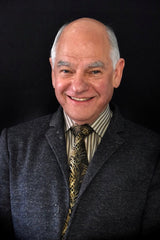 Avrum is a hematologist and medical oncologist and a Master of the American College of Physicians, an award bestowed on fewer than 500 of the 100,000 board-certified internists in the United States. He is Emeritus Clinical Professor of Medicine at the University of Southern California and a former senior investigator for the National Cancer Institute. He has been researching and publishing about breast cancer and the effects of hormone replacement for several decades.
Avrum is a hematologist and medical oncologist and a Master of the American College of Physicians, an award bestowed on fewer than 500 of the 100,000 board-certified internists in the United States. He is Emeritus Clinical Professor of Medicine at the University of Southern California and a former senior investigator for the National Cancer Institute. He has been researching and publishing about breast cancer and the effects of hormone replacement for several decades.
Dr, Barb: I receive a book in the mail every now and then in hopes that I’ll read it and comment on it somewhere. The authors of one of those books joins me today, Avrum Bluming and Carol Tavris, who wrote Estrogen Matters. This book is exactly what I needed to read, and I am so thrilled someone took on this project. I’m just really happy to have them with me today to talk more about the book Estrogen Matters. Welcome!
Avrum: Thank you, it’s good to be here.
Carol: It sure is! Thanks.
Dr. Barb: So can you tell me a little about yourselves and what roles you’ve played in medicine over the years and how you came to write this book?
Avrum: Sure. This is Avrum talking. I’m a medical oncologist, and I have been since 1967. I’m a former senior investigator for the National Cancer Institute, an Emeritus Clinical Professor of Medicine at the University of Southern California, and about 60 percent of my practice for over 50 years was devoted to the diagnosis and treatment of breast cancer.
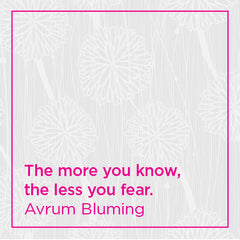 The subject of hormone replacement therapy has come up with increasing frequency over the past 20 years, since most of the treatments that we use to treat breast cancer, besides surgery and radiotherapy, usually induce premature menopause or have aggravated the symptoms of already existing menopause. And in an attempt to help women understand the conflicting opinions that have been presented in the lay literature, Carol and I decided to write this book to empower women to be able to deal with this subject intelligently, and also with the understanding that the more you know, the less you fear.
The subject of hormone replacement therapy has come up with increasing frequency over the past 20 years, since most of the treatments that we use to treat breast cancer, besides surgery and radiotherapy, usually induce premature menopause or have aggravated the symptoms of already existing menopause. And in an attempt to help women understand the conflicting opinions that have been presented in the lay literature, Carol and I decided to write this book to empower women to be able to deal with this subject intelligently, and also with the understanding that the more you know, the less you fear.
Carol: That’s a pretty good summary. I’m Carol, and I’m a social psychologist. My interest and my life’s career has been in presenting good scientific research to the public in psychological science, medical issues, and others as well. So I’m well aware of the problem of trying to talk about research in a way that people can understand and can benefit from. That’s been my great passion and interest. Avrum and I found a shared interest over the years in exactly this problem of how best to communicate scientific research in a way that people can benefit from.
Now I should tell you, as a woman of a certain age – that is to say, past menopause – I have no vested interest in the subject of HRT. Both my mother and I sailed through menopause with no particular symptoms. I never took HRT myself and so it was easy for me to take a kind of feminist “oh-hormones-are-not-necessary position.” But Avrum’s research and his commitment to understanding this question has really changed my perspective in recent years of our years working together.
Dr. Barb: I appreciate how you discuss this really complex topic. I’m a gynecologist who does primarily menopausal women’s health, so every day – multiple times every day – I have this discussion with women, and the consistent confusion and misinformation has been so disheartening to me. It’s become such an obstacle for women to receive safe and effective treatment. It’s really great to have other professionals speak into this and support the idea that it might be a safe option to offer women.
I would like to start with how you set up your book. It starts with the main idea of “Who killed HRT?” Can you summarize that for us?
Avrum: Sure. The first thing most American women think of today, if they think of hormone replacement therapy, is breast cancer. That’s because breast cancer is the dominant public relations face of hormone replacement therapy. There are a couple of things we ought to understand from the beginning. First, hormone replacement therapy really needs the use of estrogen when a women reaches menopause – and we can discuss the indications for it in just a minute. We add progesterone, which is another female hormone only in women who have a uterus because we know that estrogen, given alone, can increase the risk of uterine cancer. If progesterone is added to estrogen, that increased risk is eliminated. So hormone replacement therapy refers to either estrogen alone in women who don’t have a uterus, and the combination of estrogen and progesterone in women who do. Women generally believe that estrogen causes breast cancer. And it doesn’t. So, we started the book by attacking that misunderstanding.
If you look at the data supporting the “estrogen causes breast cancer” belief, you’ll find several lines of evidence. One that is used most often is when women who start periods early and reach menopause late and are, therefore, exposed to a longer lifetime exposure to estrogen have a higher risk of breast cancer than women who don’t follow that pattern. The data suggesting that are incorrect. If you look at the studies, the studies don’t say that.
Carol: I want to back up a step here. By the year 2000 there was a general virtually world-wide consensus in the benefits of HRT for women in menopause. That conviction and that belief came to a screeching halt with the publication of the Women’s Health Initiative in 2002. That nationally-funded study was, as we describe in the book, a scientific disgrace. There is really no other word for it. But it scared the hell out of women and out of many physicians because it claimed in its first – we have to stop the study for press announcement – that women on HRT were at greater risk in developing breast cancer. That turned out to be a statistical fluke that was gone in following analyses. So we have done a very careful analysis of what that Women’s Health Initiative did and said.
They have walked back their own scare findings in recent years, but these have not made the headlines. So what we do in our book is show the massive accumulation of evidence of the benefits of HRT for women’s heart health, and bone health, and brain health, and menopausal symptoms health, and sexual health – all of which were diminished by this unrealistic fear of breast cancer that the Women’s Health Initiative launched.
Dr. Barb: I remember that day in July. I walked into my office and by noon I had numerous phone calls from patients the day that that news broke. As providers, we hadn’t even seen the research and all of the clinical data that they were making these statements from. So it really was a bit of a travesty on all levels that we couldn’t even help guide our patients through the initial impact of that. I feel like we are still working through that each day, and that was 16 years ago that that headline came out.
Avrum: I’d like to point out that usually a study like that is released in the medical literature, the clinicians review it, and then are in a position to discuss it with their patients. And uncharacteristically, this study was released by headline, by press conference, a week before the article was available in print, and clinicians were put in the situation you found yourself in.
Dr. Barb: In the book you talk about the power of attitudes when it comes to looking at treatments and just generally in the medical field. I’m curious. Maybe, Carol, you can speak into how we can begin to move the needle or change the thoughts around what has become such a – you know, as you say, the True North now is the understanding that estrogen causes breast cancer – so how can we continue to move the attitude of women that it has been falsely planted?
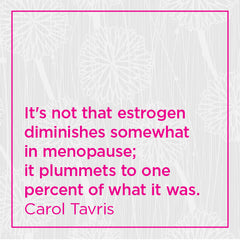 Carol: Well you know one thing is the rising consciousness and awareness of physicians like you who have to come to realize how misleading the Women's Health Initiative was and will increasingly, we hope, be in a position to use this evidence to reassure patients that there are other trends that feed into women’s suspiciousness of HRT. One is the Feminist Health Activist Group that has generally been opposed to unnecessary medicalization for women – a view that I completely agree with by and large – there is an over-medicalization of normal problem of life– but this one is quite different. In a sense, the one thing I learned from Avrum in doing this book – when you talk about hormone replacement – see this is a word many feminists dislike: “What do you mean replacement? It’s perfectly normal. Menopause is as normal as…” But I didn’t realize that it’s not that estrogen diminishes somewhat in menopause, it plummets to one percent of what it was premenopause. That means it really is replacing estrogen, not just filling the tank a little bit. That’s one thing that women need to understand is that there really is a major change in hormone levels during menopause.
Carol: Well you know one thing is the rising consciousness and awareness of physicians like you who have to come to realize how misleading the Women's Health Initiative was and will increasingly, we hope, be in a position to use this evidence to reassure patients that there are other trends that feed into women’s suspiciousness of HRT. One is the Feminist Health Activist Group that has generally been opposed to unnecessary medicalization for women – a view that I completely agree with by and large – there is an over-medicalization of normal problem of life– but this one is quite different. In a sense, the one thing I learned from Avrum in doing this book – when you talk about hormone replacement – see this is a word many feminists dislike: “What do you mean replacement? It’s perfectly normal. Menopause is as normal as…” But I didn’t realize that it’s not that estrogen diminishes somewhat in menopause, it plummets to one percent of what it was premenopause. That means it really is replacing estrogen, not just filling the tank a little bit. That’s one thing that women need to understand is that there really is a major change in hormone levels during menopause.
Second, I find this really interesting: how many women are drawn to everything but HRT. Every other possible thing including placebos and health things and vitamins and every alternative. Or bioidenticals which is an ironic word because if it’s identical, why not use the one medication that has the longest track record of research and safety indications? But your question about how attitudes should be changed: well, I think the conversation is turning. I think awareness of the problems of the Women’s Health Initiative is growing. And this has to come both from physicians – again like you – and from women themselves who I hope are beginning to realize the many benefits that HRT can provide for them.
Dr. Barb: In your book you talk about the plethora of bothersome symptoms that women may experience during menopause, which I just had to smile as I read the whole chapter because again, I’m hearing multiple symptoms every day. As you mentioned, the lengths women go through to avoid the most effective therapy we have available for them is just astonishing to me and what they are willing to suffer through for this unnecessary fear; it’s been such a frustration to me. But I don’t know that we want to spend a lot of time on the bothersome symptoms of menopause because I think many women are aware of them, and I think the good news is there has been more public awareness of how menopause disrupts women’s quality of life now expanded to mental health, sleep, joint pain, vaginal dryness, some of the things we hadn’t always associated with it, so I think the conversation has been elevated just making women more aware of how menopause can impact them.
I’d like to talk a little bit more specifically around some of the areas that you address including heart disease. You know, some of the things you point out about the leading cause of death in women and just some of the critical research that we do understand around heart health and estrogen. Can you expand on that a little bit?
Avrum: Absolutely. Heart disease kills seven times as many women in this country as breast cancer does. When women hear that what they usually say is, “Well, heart disease is responsible for the death of older women, but younger women die of breast cancer.” In point of fact, in every decade of a woman’s life from age 40 on, heart disease is responsible for more deaths than breast cancer among women. In fact heart disease is responsible for more deaths than the next 15 causes of death in the United States among women. And, estrogen can decrease the incidence of serious heart disease by 50 percent.
In 1991, Lee Goldman who was then at Harvard and is now the Dean of Columbia Medical School published an editorial in the New England Journal of Medicine saying that because of the effects of estrogen on heart disease, it is time for action – meaning prescription of estrogen, not debate – meaning not just talking about it. That was 1991.
In 1995, Bernadine Healy who was not only a cardiologist but was the first, and thus far only female director of the National Institutes of Health, wrote a book about hormones and said, “Based on what I know – this is 1995 – I will start hormones without... in a blink when I reach menopause.”
In 2000, 22 percent of women in the United States were taking hormone replacement therapy. The Women’s Health Initiative came out in 2002, and over the next eight years, that number fell to less than five percent.
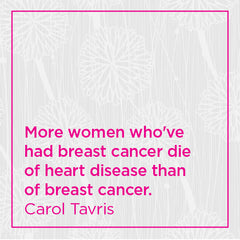 Carol: I want to add to this that more women who have had breast cancer died of heart disease than of breast cancer. That’s an extraordinary and important piece of information. I would say on this also – and this is really a theme throughout our book – that the prevailing methods and treatments and interventions for these problems such as heart disease – well let’s just say statins for heart disease were bisphosphonates for osteoporosis and so forth, but there are many – and what the health initiative people say is, “Oh, well we have ways of helping women prevent heart attacks and so forth, but statins do not have any effect on women in preventing a first heart attack, and they have many more side effects and serious consequences than HRT does.
Carol: I want to add to this that more women who have had breast cancer died of heart disease than of breast cancer. That’s an extraordinary and important piece of information. I would say on this also – and this is really a theme throughout our book – that the prevailing methods and treatments and interventions for these problems such as heart disease – well let’s just say statins for heart disease were bisphosphonates for osteoporosis and so forth, but there are many – and what the health initiative people say is, “Oh, well we have ways of helping women prevent heart attacks and so forth, but statins do not have any effect on women in preventing a first heart attack, and they have many more side effects and serious consequences than HRT does.
So we want to make clear that we examine for each of these medical concerns that women have in midlife and in an older age we examine what the alternatives are to HRT. In Avrum’s immortal words, “Estrogen is better.”
Dr. Barb: I wonder if you can share with the listeners the understanding about the window of opportunity hypothesis and the timing of initiating hormone therapy. Can you explain that a little bit?
Avrum: Sure. When the Women’s Health Initiative came out it said that hormones not only cause breast cancer – a conclusion that was not statistically significant and not valid – it also increased the risk of dementia, heart disease, and earlier death. It turns out that the median age of the women in the Women’s Health Initiative was 63. Most women reach menopause somewhere between 48 and 52. Giving estrogen to women who might already have compromised vasculature, meaning early but not yet detected heart attacks, might have for the first year after they start hormones an increased risk of a cardiac event. That is not seen among women who don’t have a history of heart disease and who start hormone replacement therapy within ten years of the menopause – and the ten years are therefore called the window of opportunity.
Carol: Basically that means when a woman enters menopause, the benefits to her of beginning HRT at that time are safest and most effective continuing through that ten-year period. What we also show in the book is that for some conditions such as preventing osteoporosis and cognitive decline, the benefits for women need to be continued beyond that window of opportunity if you will. That is for a woman’s lifetime. But in terms of alleviating symptoms, of quality of life, all the typical symptoms associated with the onset of menopause, women do well to begin it when they enter menopause.
Dr. Barb: And then there’s bone health which I think is often overlooked as a significant health risk to aging women. As a matter of fact, I rarely have women bring that in as a concern about their future health. In my own history my mother died of complications of a hip fracture when she was only 61, so I really see bone health as a critical part of aging well. Can you share a little bit about the understanding of what hormones might do regarding bone health?
Avrum: Sure. In the United States and throughout most of the western world, the number of women who died within a year of a hip fracture is about the same as the number of women who die of breast cancer. That is often ignored, and it shouldn’t be. We know that estrogen is capable of reducing the risk of osteoporotic hip fracture by 50 percent. What people who are antagonistic to HRT will say is, “Well we have very good ways of preventing hip fracture." The answer is the drugs called bisphosphonates when given either intravenously or by mouth can, in fact, reduce the risk of hip fracture for the first five years that they are administered. But beyond five years they don’t seem to work well and, in fact, can be associated with an increased risk of unusual fractures in the region of the hip, and that’s often ignored when the concept – when the subject of hip fracture is discussed.
Carol: And I would add to this because I would call up Avrum and say, “Ah, so what? Should I be taking calcium here and vitamin D and get my bones strong [laughs], and what Avrum explained to me which I hadn’t realized is that calcium and vitamin D and so forth affect the outer structure of the bone, but that is not what you need to do to prevent bone fracture which depends on the internal tensile strength of the bone. It’s the ability to bend when challenged if you will. Estrogen is really the best and most effective way to preserve the interior flexibility of bone.
Avrum: A short way of saying that is that calcium and vitamin D, in spite of what we hear on television, do not prevent menopausal bone fractures.
Carol: Well said, indeed.
Dr. Barb: And then behind breast cancer is the fear of dementia, another fear I hear expressed probably nearly daily. So this is an area that has had very confusing headlines around hormone therapy, and does it add to the risk of dementia or not. So can you expand on some of the present understanding of women and hormones and the role with memory and cognition?
Carol: Yes, I’ll tell you what I can remember of this [laughs]. For me, a colleague in my field, Barbara Sherman in Canada, had been studying the effects of estrogen on brain function in animals and humans in experimental studies in real life interventions, and for Sherman there is just no question that estrogen was a tremendous benefit in preserving cognitive function in animals and in humans. So Avrum and I from our different professional directions were able to confirm this research in many many studies around the world the benefits of estrogen for preserving cognitive abilities and protecting against the risk of Alzheimer’s and other dementias.
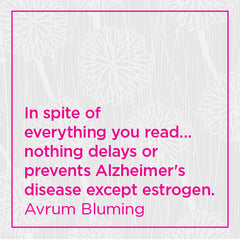 Avrum: In 1900 only five percent of all American women lived beyond their fifth decade. Today life expectancy is close to 80 years. A women in her 60s is twice as likely to develop Alzheimer’s disease as she is to develop breast cancer. And the cure rate for newly diagnosed breast cancer now approaches 90 percent. The cure rate for Alzheimer’s disease is zero. In spite of everything you read and the drugs that are being tried – both those advertised and those requiring a prescription – nothing significantly delays or prevents Alzheimer’s disease except estrogen which can decrease the risk of Alzheimer’s disease by up to 50 percent.
Avrum: In 1900 only five percent of all American women lived beyond their fifth decade. Today life expectancy is close to 80 years. A women in her 60s is twice as likely to develop Alzheimer’s disease as she is to develop breast cancer. And the cure rate for newly diagnosed breast cancer now approaches 90 percent. The cure rate for Alzheimer’s disease is zero. In spite of everything you read and the drugs that are being tried – both those advertised and those requiring a prescription – nothing significantly delays or prevents Alzheimer’s disease except estrogen which can decrease the risk of Alzheimer’s disease by up to 50 percent.
Carol: I want to add one thing to that, also from Barbara Sherman, that I think is so important. Sherman used to say, “People say taking hormones isn’t natural. There’s something wrong with it because it’s just not natural.” What isn’t natural is living 30 years beyond menopause. Women used to die much earlier as Avrum just said. What isn’t natural is living to be 80-85-90 years old. She said, “If estrogen can help preserve our cognitive abilities in those later years, I’m for it.”
Dr. Barb: Do you have any insight into what the mechanism of action might be of the role of estrogen in brain health?
Avrum: Absolutely, and in fact that’s discussed in the book. One of the things that you know, Barbara, from reading the book is we aren’t just giving our opinions. It is the kind of book that is written for both the lay audience and for the professional physicians, so that it references studies, and these can be independently researched by the people who read the book. We know – and this is work from Roberta Diaz Brinton who used to be at USD and is currently in Arizona, that estrogen can increase the growth of projections off of neurons in the brain allowing them to make additional connections with other neurons which is a way of preserving nerve function. It also stimulates the support cells called oligodendroglia. These cells are also responsible for normal nerve health. We go into more detail in the book; I think I’ll avoid the detail in this kind of a discussion.
Carol: But we don’t want to alarm your listeners in the sense that – Avrum just made a very important point and this is what’s of interest to me as a science communicator. What we want to do in this book as what Avrum just said so clearly, is we want leaders to know that this is not just our personal opinion, or that we are mouth pieces for the drug industry or any other such thing. Neither of us has any vested interest in HRT commercially, personally, and so forth. But what we do feel very strongly about is giving leaders the information they need, and then with as much detail as they are interested in pursuing. If they want to know what all the studies are, look guys; here it is. If you don’t, we’ll cut to the chase. But we really want to emphasize that our point of view comes from a review of 70 years of research on the benefits of hormone replacement therapy.
Are there risks? Yes, of course there are risks. We think they are minor risks in comparison to the major benefits for most women, but that will be something for every woman who reads this book to determine.
Avrum: We are very pleased that if you look at the people who endorsed our book, they include Jerry Kassirer, who is the former editor in chief of the New England Journal of Medicine; Vince DeVita, who is the former director of the National Cancer Institute; Michael Baum, who is one of the leading breast cancer researchers in England; Leslie Turnberg, who is former president of the Royal Society of Physicians and Women’s Health Act.
Carol: Yes, Women’s Health Act.
Dr. Barb: Yes, I get excited about that, and I’m curious about what kind of reaction you have had to the book.
[silence…]
Carol: [laughs]
Avrum: The silence you hear on this end of the line is, the people who have read the book have loved it. The reviews that we’ve gotten have been almost all five star. We’ve been waiting to be criticized, and we’ve asked to be criticized by the people we criticize in the book. And…
Carol: Silence from them. Silence from them. So you know, I don’t know. Are we just, um, little noisy characters that are on the fringes of this discussion that we’re not even worth arguing with? I don’t know. So far the women, who have read the book, the physicians who have read the book have been ecstatic as they have written to us to tell us. But still the Women’s Health Initiative has not responded.
Avrum: We’re also not trying to sell anything here. Henry James once said, “Nothing is my last word about anything.” And that’s certainly true. In science you always keep an open mind. You look to change your mind. That’s how we help make progress. But in order to develop this concept more, we welcome the criticism that we just haven’t received so far.
Dr. Barb: You know, I’m going to quote you. But in your book you state that “It can be daunting to hold and espouse a minority opinion in medicine.” And I would say for the last years that I have been doing menopausal women’s health, I can totally relate to that. Because I would say my non-gynecologic colleagues, and some of them on occasion have openly admonished me for my efforts, but my patients just keep me doing this because they are so fervent in their response to treatment. And the success of how hormone therapy can, literally – women have talked about saving lives!
Just this week I had a patient who herself is an attorney. She had such a remarkable improvement in her quality of life on hormone therapy that she has a daughter who is in medical school, and she is recommending her daughter pursue an area of medicine that will address women’s health care and, specifically, to help further this understanding, and help women achieve this improved this quality of life. So I’m so happy to know that you have opened the door to allow women to rethink and revisit the safety of choosing a very effective medication option.
Carol: Thank you so much for saying this. We seem to hear this over and over again from women who found once they go on hormones just feel so relieved. A psychotherapist wrote to us. She said, “I deal with women in midlife,” and she said, “I see so many of the conflicts, the problems, and unhappiness, and depression that they have that right in their lives. And they attribute it to everything but menopause. And they go on HRT and their lives are changed so much for the better.”
Avrum, of course, has been hearing from his patients constantly over the years that he’s doctored: “I’ve moved to Minnesota and no doctor over here will not prescribe me HRT, and I’m 78 years old and they’re worried I’m going to get dementia! And never mind that I’m running my own business."
So, I’m hoping that the voices of women, you know, are going to their physicians and saying, “Look here! The evidence supports this!” That is going to be startup of this transformation that we need.
Dr. Barb: And you also pose a question of, “Can a breast cancer survivor take estrogen?” which has totally been taboo. And I have a number of patients – breast cancer patients – who are on estrogen, but they make that decision against multiple voices advising them not to. You know, I had a woman tell me, “I might as well step out in front of a semi-truck if I’m not going to have that as an option to continue." So again, this idea that that could be an option, can you give me a little insight as to how you have that conversation in helping those patients make a decision about whether or not to consider estrogen for a treatment?
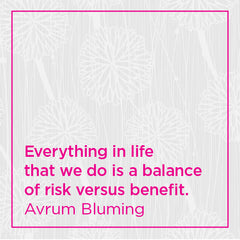 Avrum: Everything in life that we do is a balance of risk versus benefit, and we have to understand that. We are not marketing this, just the way we object to people uniformly condemning it. It requires an informed discussion with the patient. What I’ve done for the last – it’s now 20 years – is because I was aware of how women with a history of breast cancer were suffering, I reviewed the literature to see what we knew about hormones and breast cancer, and what I found is we used to tell women who had breast cancer – premenopausal women – they should have their ovaries removed since if estrogen causes breast cancer, we’re removing the ovaries to prevent it from coming back. And there were seven large studies that looked at that, and the result was it didn’t have any effect on preventing it from coming back.
Avrum: Everything in life that we do is a balance of risk versus benefit, and we have to understand that. We are not marketing this, just the way we object to people uniformly condemning it. It requires an informed discussion with the patient. What I’ve done for the last – it’s now 20 years – is because I was aware of how women with a history of breast cancer were suffering, I reviewed the literature to see what we knew about hormones and breast cancer, and what I found is we used to tell women who had breast cancer – premenopausal women – they should have their ovaries removed since if estrogen causes breast cancer, we’re removing the ovaries to prevent it from coming back. And there were seven large studies that looked at that, and the result was it didn’t have any effect on preventing it from coming back.
Currently as many men who die of prostate cancer in this country as women die of breast cancer, and testosterone has been linked more closely with prostate cancer than estrogen has with breast cancer. Do you know how many studies there are of castrating men who had prostate cancer to prevent it from coming back? The answer is zero, and there never will be.
And yet, we have those seven large studies in women. We told women that you must never get pregnant after breast cancer since pregnancy bathes the body in estrogen. We now know that pregnancy does not increase the risk of recurrence, and now women are getting pregnant after breast cancer. So William Creasman, a gynecologist in South Carolina, said, “Well if women can continue their periods after they’ve had breast cancer, and if getting pregnant after breast cancer doesn’t increase recurrence, why can’t we give estrogen to women with a history of breast cancer?" And there are now 16 studies in the literature which we quote and cite in the book looking to see what happens to women who take hormones after breast cancer. And 15 of the 16 studies found that there’s no increased risk of recurrence.
I have to mention, though, that these studies usually don’t follow women, or at least haven’t recorded on them beyond ten years. One study called The Habit Study, which came out of Sweden, found an increased risk of breast cancer occurrence. That study lasted two and a half years; they did not accumulate the patients they said they were going to study; the study has been criticized in the literature, and that short study is cited by people against hormones as being the study we should follow, whereas there are 15 studies, including one that I did and published up to 14 times annually in the literature, showed no increased risk of recurrence.
And let me add, as long as nobody has jumped in, I’m still not routinely recommending it saying it’s something you should do. It’s something that can be considered. You have to look at the benefit and risk of this approach, discuss it with your physician, and then make as an informed a decision as you can.
Dr. Barb: Exactly. I think that’s the nuance there. And I do want to add to that that I think most organizations have recognized the safety of using localized estrogen or treatments for vaginal atrophy. That’s another area of interest that I have around sexual health that so many women, especially our breast cancer patients, who often are very young, have had significant impact to their relationships as a result of the menopausal atrophy that occurs and really don’t know about the safe options that are available to them.
Carol: Absolutely. That’s really important. Even the Women’s Health Initiative, rather grumpily, has finally acknowledged that vaginal inserts and the use of estrogen, vaginally, is completely safe. They are so grumpy that they’ve walked back their earlier dire warnings, and yet any product with estrogen in it still has this sort of serious alarm warnings – may increase the risk of dementia or heart disease or blah blah blah – which is not the case.
Dr. Barb: I know. That’s the other – the labeling for our products has always been a hurdle for us too as providers to try and help women put that into perspective.
Carol: In the book, the couple, the woman who was prescribed vaginal inserts, and she and her husband then read the dire warnings that came with the package and decided, no, no; they’d rather not have sex than have her get dementia and heart disease. That’s really unfortunate.
Dr. Barb: It’s tragic what’s happened, but again thank you for your efforts. I just want to just repeat that the name of the book is Estrogen Matters, but the subtitle is important: Why Taking Hormones in Menopause Can Improve Women’s Well-Being and Lengthen Their Lives – Without Raising the Risk of Breast Cancer. So I’m so excited again. It sits in my consult room. I’ve got it sitting out. I point it out to women, and I’m recommending that women take the time to go through it to help be better informed about making their own decisions for their own health and wellness.
Carol: Well, well, Dr. Barb. Thank you very much for such warm support from you. We are very, very grateful.
Dr. Barb: In conclusion, I often like to ask those I’m interviewing about where do you find fullness at this stage of your life? Would you be willing to give a minute and share that?
Carol: [laughs] There’s an unexpected question.
Avrum: When I was five years old, Barb, and I used to get depressed, one of the ways I dealt with it was I would walk in Brooklyn, New York to the nearest shopping center. I find an old lady who I guess must have been in her 20s who is having trouble carrying groceries, and I offered to carry the bag for her. And I would follow her home – clearly it wasn’t a big bag; I wasn’t very big myself – and when we’d reach her home, she usually offered me a nickel and I would turn the nickel down and bathe in the praise that I got just from being a help. That feeling has never left me, and I’m still trying to do that.
Dr. Barb: Well you have done that in this book. I will say the accomplishment of publishing this book hopefully will bring you great feeling of accomplishment and improving many women’s lives despite not having to carry bags for them.
Avrum: Well, this call certainly helps. Thank you so much, Barb.
 Dr. Barb DePree, M.D., has been a gynecologist and women’s health provider for almost 30 years and a menopause care specialist for the past ten.
Dr. Barb DePree, M.D., has been a gynecologist and women’s health provider for almost 30 years and a menopause care specialist for the past ten.


0 comments